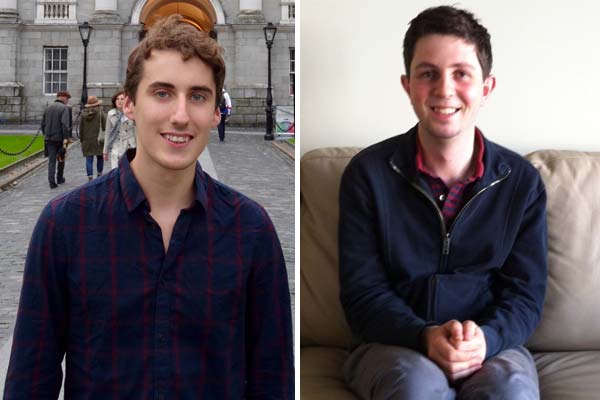
Dean McHugh and Ira Halpern were both Highly Commended for their research
Philosophical theory to Faerie Queene botany: U of T alumni recognized in global Undergraduate Awards
Published: October 7, 2015
Eight U of T graduates have been named to the Highly Commended list at this year’s Undergraduate Awards – a global competition inviting top students from around the world to take part at its Global Summit in Dublin starting November 10.
To make it into the ‘Highly Commended’ category a student's academic paper or research must be ranked in the top 10 per cent of more than 5,000 submissions. The competition is open to students in their final or penultimate year of studies. Read more about the Undergraduate Awards.
Over the years, U of T students have regularly numbered among this elite group. (Read about more Highly Commended U of T alumni)
This year’s finalists and their categories are:
Raghav Singal - Engineering and Built Environment
Dominic Liao-McPherson - Engineering and Built Environment
Xiyu Liu - Engineering and Built Environment
Misha Boutilier - History
Ira Halpern - Literature Pre-1710
Roshaan Wasim - Literature Pre-1710 & Literature 1710-Present
Dean McHugh - Philosophy & Theology
Winnie Lieu - Psychology
U of T News spoke with a few of the finalists. More stories featuring the great work of other Highly Commended alumni are still to come…
DEAN MCHUGH
What was your paper about?
The paper is titled ''Tropes and the Problem of Properties.” I was curious about how we think of things having properties, like 'being red' or 'being an atom’. Some philosophers talk about properties as abstract things (red-ness or atom-ness, for example) existing above and beyond the physical world. But I think that’s a bit too mystical. Theory should strive to be grounded in concrete reality. I wanted to explain properties as a special relationship between physical things. To do that successfully, my paper had to be very general but very precise. That’s why I used set theory to explain the relationship.
What are you hoping to get out of the Dublin conference?
I’m really looking forward to the conference in Dublin. I’m actually based at Trinity College Dublin, and I attended U of T for a year as an exchange student. I’ll be representing U of T at the conference though, because that’s where I did the research. I’m proud to represent U of T because the philosophy department made a huge impression on me. The conference is happening close to home but I’m excited about the global reach of the Undergraduate Awards. International engagement is one major reason why I decided to go on exchange to U of T, and the chance to experience other places through education has always been a positive one.
What’s next for you?
My plan is to do philosophy for as long as I can, which of course means staying in university. I love the community of a university, so this plan suits me down to the ground. U of T has one of the best philosophy departments in the world so I'll be applying to do a PhD in philosophy there soon. I would be very happy to live in Toronto again if the opportunity arose.
Any supporters at U of T who helped you along the way?
My paper never would have happened without the guidance of Amber Ross. She was incredibly patient and really listened to me. I think that’s what the Undergraduate Awards celebrate – listening to undergraduate researchers and taking them seriously. My classes and conversations with James Robert Brown really got me thinking about the relationship between philosophy and science, which was instrumental to the argument in my paper. He was a true mentor.
The support U of T provides to exchange students was incredibly helpful. The Centre for International Experience helped foster a research atmosphere where I could make my best contribution to the topic and made the whole experience as fulfilling as possible.
Other highlights of your time at U of T?
During my time in Toronto, I sang with the Hart House Chorus, which included a tour to Brussels as part of the ‘1000 Voices for Peace’ festival where we represented Canada and sang for the King and Queen of Belgium.
I participated in a St. Mike's volunteering program called On Your Mark. I provided academic support to fifth graders from Spanish and Portuguese speaking families. I was a staff member with UTMUN, U of T's Model United Nations, where we invited high school students on campus to debate topics in international relations. Finally, I served as arts editor with the newspaper, U of T's independent newspaper.
IRA HALPERN
What was your paper about?
My paper, "The Botany of The Faerie Queene," is about botanical imagery in Edmund Spenser's epic poem. I found that botanical imagery served as a way of accessing themes in The Faerie Queene such as decay, the transience of pleasure, and death – great stuff for an English specialist.
What’s next for you?
I am hoping to go to graduate school for English literature.
Any supporters at U of T who helped you along the way?
I have had an excellent experience at the University of Toronto. Special thanks to Professor David Galbraith for his guidance on this particular project.
How else did you get involved at U of T?
I am an associate editor of IDIOM, the undergraduate, academic English literature journal at the University of Toronto. I have had an essay on Edith Wharton published in the peer-reviewed journal, The Explicator, and an essay on David Foster Wallace published in the refereed online journal, Drain. I also have a book chapter coming out soon for Critical Insights: Robert A. Heinlein, published by Salem Press.


